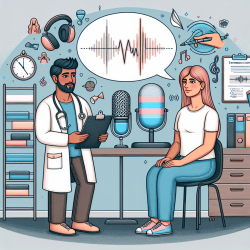Enhancing Practitioner Skills through Neurodiversity Research
The Covid-19 pandemic has significantly altered the landscape of education and therapy, necessitating a shift towards digital platforms and remote interactions. For practitioners in speech-language pathology, this transition offers both challenges and opportunities. A recent research article titled Neurodiversity, Networks, and Narratives: Exploring Intimacy and Expressive Freedom in the Time of Covid-19 provides valuable insights that can help practitioners enhance their skills and improve outcomes for children.
Key Findings from the Research
The study, conducted by Betts et al. (2023), examines the impact of digital platforms on neurodivergent individuals during the pandemic. The research highlights the following key points:
- Digital platforms have provided neurodivergent individuals with new avenues for expressive freedom and self-advocacy.
- The shift to remote interactions has allowed for more inclusive and accessible communication methods.
- Community-building through online networks has fostered a sense of belonging and support among neurodivergent individuals.
Implementing Research Outcomes in Practice
Practitioners can leverage these findings to enhance their skills and improve therapy outcomes for children. Here are some practical steps:
1. Embrace Digital Platforms
Utilize digital platforms to create a more inclusive and accessible therapy environment. Tools like Zoom, Discord, and other communication apps can facilitate real-time interactions and provide various communication options, such as text, voice, and video.
2. Foster Expressive Freedom
Encourage children to use multiple forms of expression, including written, spoken, and visual narratives. This approach can help them find their preferred mode of communication and self-expression.
3. Build Supportive Communities
Create online communities where children and their families can connect, share experiences, and support one another. These communities can provide a sense of belonging and reduce feelings of isolation.
Encouraging Further Research
While the current research provides valuable insights, there is still much to explore. Practitioners are encouraged to engage in further research to deepen their understanding of neurodiversity and its implications for therapy. Areas for further investigation include:
- The long-term impact of digital platforms on neurodivergent individuals.
- Best practices for integrating multiple forms of expression in therapy.
- Strategies for building and maintaining supportive online communities.
Conclusion
The research article Neurodiversity, Networks, and Narratives: Exploring Intimacy and Expressive Freedom in the Time of Covid-19 offers valuable insights that can help practitioners enhance their skills and improve outcomes for children. By embracing digital platforms, fostering expressive freedom, and building supportive communities, practitioners can create a more inclusive and effective therapy environment.
To read the original research paper, please follow this link: Neurodiversity, Networks, and Narratives: Exploring Intimacy and Expressive Freedom in the Time of Covid-19.










